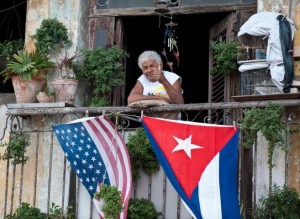
Cubanet, Rafael Alcides, Havana, 3 August 2015 – For some, it began on 17 December of last year, when – as surprisingly as a goal scored at the last minute deciding a world championship – the leaders Barack Obama and Raúl Castro publicly announced the reestablishment of diplomatic relations between Cuba and the United States, following 50-some-odd years of politicians on both shores hurling invective at each other. But that was still just an announcement, the prologue. The materialization of the historic event – the first part of which was accomplished on 20 July when the Cuban government inaugurated its embassy in Washington – will take place when, this coming 14 August, John Kerry will raise the US flag at the American embassy’s old-time home facing Havana’s Malecón.
It is a moment awaited with curiosity by Cubans in general – and, very particularly, by that part of the dissidence that supports the reconciliation of the two governments. What will come later? The conjectures are flying and there is not one that can be taken seriously. But one thing that is known, that is certain, everywhere, is that tomorrow has begun, and yesterday has started to become a distant memory. It’s what can be heard in the lines to buy eggs, at the neighborhood domino tables, at bus stops, in factories, in offices, at funeral wakes, and at any other place where two or more Cubans are together, talking.
The government doesn’t see it this way, and it continues to make plans with the optimism of someone who is sure of its people’s unconditional approval. It insists on governing under the rallying cry of “Socialism or Death” for all time.
Nor does a certain segment of the dissidence see it this way. This is the part that has seen Obama give everything in return for nothing; that fears that the measures to soften the economic embargo, which have already begun to be seen, will regenerate a regime which (notwithstanding what should, by natural law, have already occurred in Venezuela, but has not) would otherwise be a memory today.
The other segment, the optimistic one, already sees itself raising a glass on that great day marking the start of the future, as they come and go amongst government authorities who, in Panama, fearing contamination, refused to stay under the same roof and breathe the same air as their opponents. Because of course, those people (the ones in Panama, at least) could not but be there that day, when their foreign minister, Bruno Rodriguez, sat down with his counterpart, John Kerry.
It is not to be believed that the US Embassy will also then allow itself to be restricted by the condition that for several years now has been governing festivities sponsored by accredited diplomats in Cuba. It is an unusual constraint that prevents ambassadors from simultaneously receiving on their premises both government dignitaries and dissidents. Or to put it another way, it obliges them to have the government people enter through the front door, and the dissidents through the back.
The US would never accept such a thing. In that case, the optimistic dissidence maintains, the other embassies would find themselves dispensed from continuing to carry such an onerous burden. Thus, another significant breach between the two sides of the opposition.
Of course, “Who Knows Who” does not live far from there. But in any case – as an estimable dissident told me who practically applauded the skin off his hands on December 17 and who today avidly awaits August 14 – “that embassy” is over there, too, to provide its occupants the pleasure of looking over their celebratory glasses towards those captious attendees of the Panama summit, as if to say, “Never say never.”
“That embassy over there,” he continued, will be an important and none-too-silent witness of what is happening with human rights in Cuba. For the moment, the government will continue to arrest and abuse, but it will have to do so with much caution, given that it is being observed in situ; and given that neither the tourist, nor the investor, nor any of the characters who will play a role in the future that has just started, would much like the spectacle of police massacring the citizenry who, in exercising a universal right such as that of dissent, has gone out on the street to demonstrate. Besides, what’s coming now in the bilateral relations is “I’ll give this much if you give that much.” And Time, for Its part, continues to march over the administration of little old men who have run out of time.
All this would seem to confirm what the journalist Regina Coyula was saying in a tweet launched into the ether at 12 midnight on July 20 that, while seeming to have given all in exchange for nothing, the astute Obama had reopened the US embassy in Havana in a “subtle stratagem that one day will be dubbed a novel version of the Trojan Horse.”
Translated by: Alicia Barraqué Ellison
